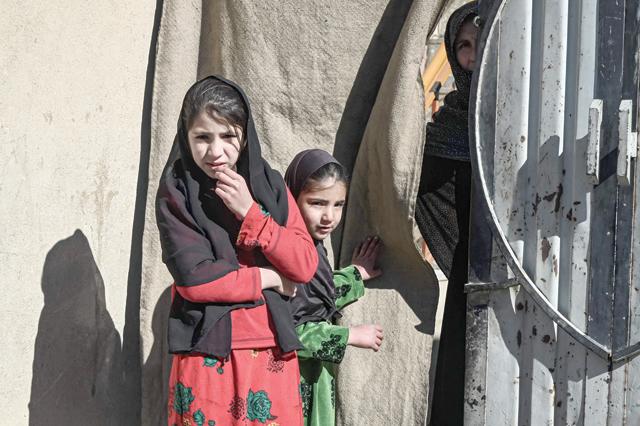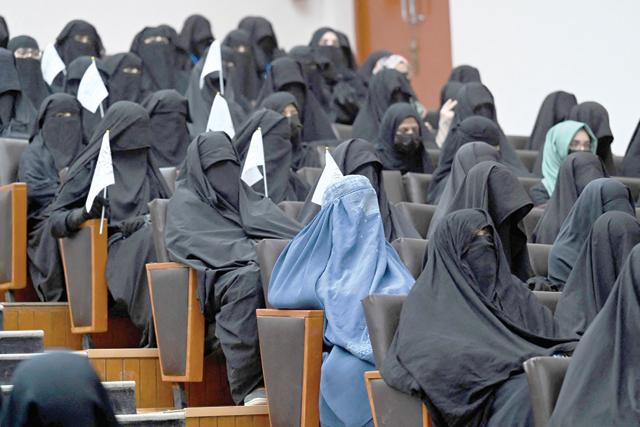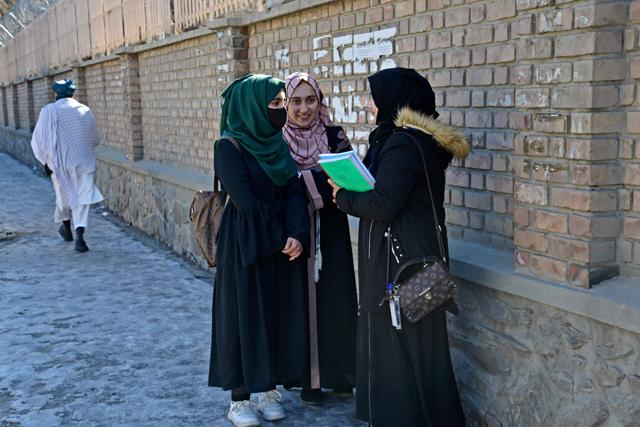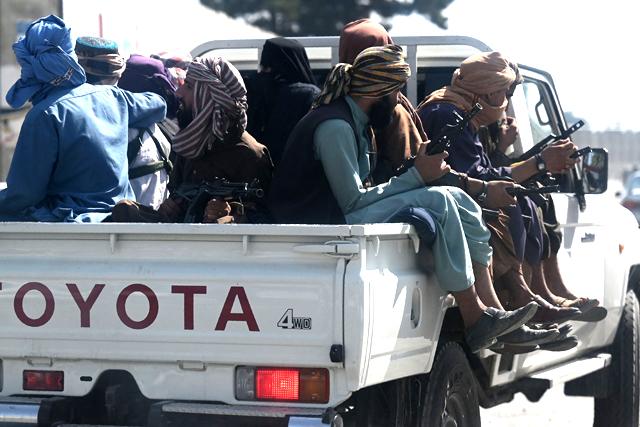You are here
Afghan universities reopen with trickle of women attending
By AFP - Feb 03,2022 - Last updated at Feb 03,2022

Girls stand outside their house in Kabul on February 1 (AFP photo)
MIHTARLAM, Afghanistan — Some public universities opened in Afghanistan on Wednesday for the first time since the Taliban seized power in August, with a trickle of women attending classes that officials said would be segregated by sex.
Most secondary schools for girls and all public universities were shuttered when the hardline Islamist group stormed back to power, sparking fears women would again be barred from education — as happened during the Taliban's first rule from 1996-2001.
"It's a moment of joy for us that our classes have started," Zarlashta Haqmal, who studies law and political science at Nangarhar University, told AFP.
"But we are still worried that the Taliban might stop them."
One analyst said the reopening of universities was a "critical marker" on the Taliban's road to international recognition.
Officials said universities in Laghman, Nangarhar, Kandahar, Nimroz, Farah and Helmand provinces opened on Wednesday.
More were scheduled to resume operations elsewhere in the country later this month.
An AFP correspondent saw one small group of women, wearing the all-covering burqa, enter Laghman University early Wednesday.
The men who attended, ferried to the campus in local taxis and buses, were dressed in traditional tunics known as shalwar kameez.
Attendance was very light and Taliban fighters guarded the entrance, a tripod-mounted machine gun resting on a boom gate.
Most students declined to offer their thoughts on returning to class, with some saying they had been warned by authorities not to speak to the press.
Journalists were prevented from entering the Laghman campus and universities in other provinces.
Shortage of women lecturers
The Taliban have said they have no objection to education for women, but want classes to be segregated and the curriculum based on Islamic principles.
"We were told that the classes will be held according to the Sharia law," said Malik Samadi, a 23-year-old mathematics student.
"I hope that they keep all the courses, because society needs them."
“Education is the foundation of a country,” said civil engineering student Munsefullah at Helmand University, expressing joy at returning to his studies.
Still, while happy to be returning to lectures, one student looked beyond her studies with pessimism.
“We are also sad because being political and law students, our future is at risk as we won’t be able to get jobs under this regime,” said Khadija Azizi from Nangarhar University.
“It’s no more pleasant for us because we have lost hope for our future.”
Some were also sad as many of their fellow students had fled when the Taliban seized power.
“The university’s environment was not so pleasant as there were very few students,” said Baz Mohammad, a student at Nimroz university.
Some institutions like Laghman University faced shortage of women teachers. The university had only one female teacher for about 270 female students.
University head Asmatullah Durrani said the board was now looking to “recruit more women” teachers.
The United Nations Assistance Mission in Afghanistan chief Deborah Lyons called for more “scholarship programmes and support” to lecturers now that the universities were opening.
‘Critical marker’
The reopenings come a week after a Taliban delegation held talks with Western officials in Norway, where they were pressed on improving the rights of women to unlock billions of dollars in seized assets and frozen foreign aid.
The halting of aid has triggered a humanitarian crisis in Afghanistan, which has already been devastated by decades of war.
No country has yet recognised the new Taliban regime, which has promised a softer version of the harsh rule that characterised their first stint in power.
The regime has imposed several restrictions on women, including banning them from many government jobs.
The Taliban say all girls’ schools will reopen by the end of March.
“The reopening of public universities... would bode well for the return of girls [to school] around the country,” United States Institute of Peace analyst Andrew Watkins told AFP.
“This is the Taliban taking a step that would be a critical marker in moving closer towards recognition.”
Related Articles
KABUL — Afghan women will be allowed to attend university as long as they study separately from men, the Taliban's new higher education mini
KABUL — Afghanistan’s main universities reopened on Saturday six months after the Taliban returned to power, but only a trickle of women wen
KABUL — Taliban fighters advanced deep into the last holdout province of Panjshir Sunday, as the top US general warned Afghanistan fac


















